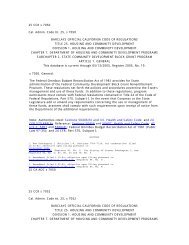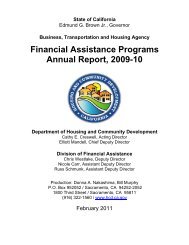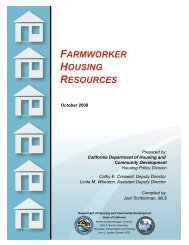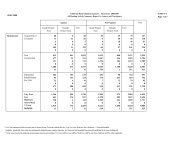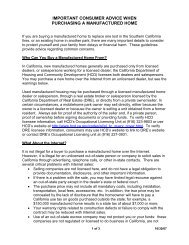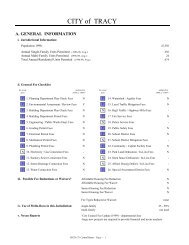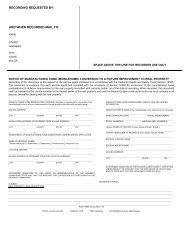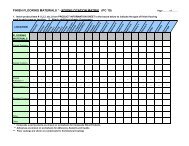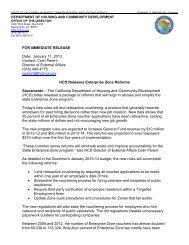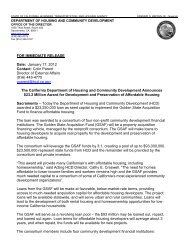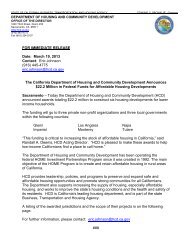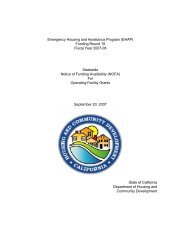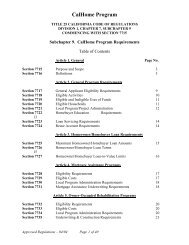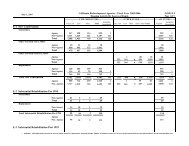Adobe PDF - California Department of Housing and Community ...
Adobe PDF - California Department of Housing and Community ...
Adobe PDF - California Department of Housing and Community ...
You also want an ePaper? Increase the reach of your titles
YUMPU automatically turns print PDFs into web optimized ePapers that Google loves.
INDUSTRY QUESTIONS AND ANSWERS<br />
The following Questions <strong>and</strong> Answers were provided by MH industry representative JC Strutzel<br />
<strong>and</strong> do not necessarily reflect the position <strong>of</strong> HCD. However they may provide applicants <strong>and</strong><br />
licensees with the perspective <strong>of</strong> a long time industry expert relating to a topic that is becoming<br />
more common in today’s economic era.<br />
1) Q: So how do Dealers <strong>and</strong> Brokers cooperate?<br />
A: If someone licensed only as a Dealer cooperates with a Broker, the sale is subject to §18035 Health<br />
<strong>and</strong> Safety Code <strong>and</strong> the Dealer must control the sale. The Dealer is charged with the responsibility <strong>of</strong><br />
controlling the transaction <strong>and</strong> making sure the sale conforms to HCD law. The Dealer is identified as<br />
the 'Seller' in the escrow <strong>and</strong> purchase documents. The Dealer is allowed to pay, <strong>and</strong> the Broker is<br />
allowed to receive, a 'referral fee' even though the Broker has performed a function that requires a DRE<br />
license.<br />
2) Q: Does that mean a Dealer/Broker cooperative sale would conform to both DRE <strong>and</strong> HCD<br />
law?<br />
A: No. The respective legal processes governing Dealers <strong>and</strong> Brokers are vastly different. The<br />
transactional differences between the two make it impossible to comply with both sets <strong>of</strong> laws at the<br />
same time. The law governing cooperative sales between a Dealer <strong>and</strong> Broker is Dealer law such as<br />
found in Division 13, Part 2, <strong>of</strong> the Health <strong>and</strong> Safety Code. Within that body <strong>of</strong> law is Section 18035<br />
Health <strong>and</strong> Safety Code, which contains a code specified escrow law.<br />
3) Q: Why was HCD law chosen over DRE law as the regulatory process <strong>of</strong> choice?<br />
A: Both the <strong>California</strong> Association <strong>of</strong> Realtors (CAR) <strong>and</strong> HCD expressed opinions on this issue. Both<br />
parties agreed that such transactions should only be covered by one body <strong>of</strong> law. CAR recommended<br />
DRE law because it annually protected hundreds <strong>of</strong> thous<strong>and</strong>s <strong>of</strong> real property homes. HCD said the<br />
rights <strong>of</strong> the consumer were far greater under HCD law. HCD prevailed.<br />
4) Q: If the buyer, seller, Dealer <strong>and</strong> Broker all agreed, could a Dealer <strong>and</strong> Broker each process<br />
their end <strong>of</strong> the deal according to HCD <strong>and</strong> DRE law respectively?<br />
A: No. As already stated, it is impossible to comply with both regulatory schemes at the same time.<br />
There are unavoidable conflicts that cannot be waived.<br />
5) Q: What are some <strong>of</strong> those conflicts?<br />
A: Examples <strong>of</strong> some conflicts are:<br />
1. Dealers are in the chain <strong>of</strong> title; they guarantee title like an auto- mobile dealer (DMV dealer law<br />
was the genesis for HCD dealer law). Brokers act only as agents.<br />
2. The rights <strong>of</strong> consumers differ significantly depending upon whether HCD law or DRE law is<br />
applied. A few examples are: under DRE law a buyer <strong>and</strong> seller can agree to liquidated<br />
damage clauses; early releases <strong>of</strong> funds from escrow; or waive the creation <strong>of</strong> an escrow. All<br />
three <strong>of</strong> these actions violate HCD law.<br />
3. Remedies for the consumers differ depending upon which body <strong>of</strong> law governs the transaction.<br />
4. A 'secured party' (i.e. a 'legal owner or junior lienholder) is required to deliver their original title<br />
document <strong>and</strong> a HCD 'Conditional Release <strong>of</strong> Interest' form prior to the pay<strong>of</strong>f <strong>of</strong> their liens if the<br />
escrow is governed by HCD law (§18035(d) Health <strong>and</strong> Safety Code). In all other instances a<br />
secured party is not required to deliver their original title to escrow until after receiving payment<br />
in full <strong>of</strong> the unpaid balance due on their loan.<br />
HCD law prohibits any provision in an agreement that waives the buyer's rights. Any waiver is<br />
deemed contrary to public policy <strong>and</strong> is deemed void <strong>and</strong> unenforceable.<br />
xiii



